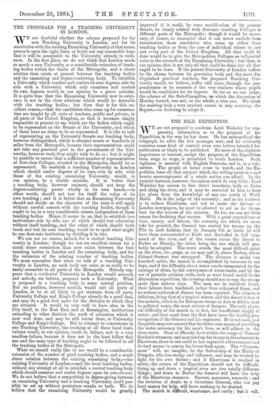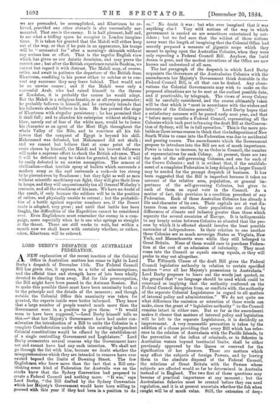THE NILE EXPEDITION.
WE are not prepared to condemn Lord Wolseley for sup- pressing information as to the progress of his Expedition in the way he has done. He has monopolised the telegraph, he edits the few messages sent, and he evidently exercises some kind of control even over letters intended for publication or likely to be published. No news of the slightest importance or interest, except the progress of the Expedition from stage to stage, is permitted to reach London. Such vigilance is unusual with English Generals, and is as a rule, unwise. The people at home cease to watch, and the Ex- pedition loses all that support which the willing assistance and hearty encouragement of a whole nation can afford. In the present instance, however, the nation could do very little ; Lord Wolseley has reason to fear direct treachery, both at Cairo and along the river, and it may be essential to him to keep his plans from the knowledge of any one north of Wady Haifa. He is the judge of the necessity ; and as his business is to relieve Khartoum, and not to make the fortune of London newspapers, he must be allowed to act as he deems best for the success of his mission. So far, we can see little reason for doubting that success. With a great expenditure of time, money, and labour, the necessity for which we must take for granted, the General has carried his troops up the Nile in such fashion, that by January 7th at latest he will have them concentrated at Korti and Ambukol in full com- mand of the river, and of the routes across the desert to Berber or Shendy, the latter being the one which will pro- bably be adopted. The route avoids the most difficult point on the river, the gorge, as we may call it, above Berber, where Colonel Stewart was entrapped. The distance is under two hundred miles, the march is accomplished by caravans in ten days, and if the difficulty about water can be surmounted by the carriage of skins, by the conveyance of water-tanks, and by the use of portable artesian wells, such as were found useful in the Abyssinian expedition, the crossing should not occupy the troops more than sixteen days. The men are in excellent heart, their labours have hardened, rather than exhausted them, and no serious outbreak of disease has been reported. The climate is delicious, being that of a tropical winter, and the desert is free of the malaria, which is, for European troops in Asia or Africa, next to polluted water, the most serious of dangers. The only physi- cal difficulty of the march is, in fact, the insufficient supply of water ; and that must from the first have been the leading pre- occupation of the General and his engineers. He is not rash, and the public may rest assured that he either sees means of providing the water necessary for his men's lives, or will adhere to the river-route. Once at Shendy, he is within the range of General Gordon's steamers, and may send up his troops in detachments to Khartoum, there to rest until he has organised a Government and devised means to convey his forces back again. The " Govern- ment " will, we imagine, be the Sultanship of the Mudir of Dongola, who has energy and influence, and may be trusted to fight for his own throne ; and if Khartoum is reached in safety, the return of the Expedition should not be difficult. Going up and down a tropical river are two totally different things ; and down to Berber the General will have the help • of the Khartoum steamers. Success, moreover, succeeds ; and the devotion of Arabs to a victorious General, who can pay hard money for help, will leave nothing to be desired.
The march is difficult, wearisome, and costly ; but it will, we are persuaded, be accomplished, and Khartoum be re- lieved, provided one other obstacle is also successfully sur- mounted. That one is the enemy. It is half pleasant, half sad, to see what a trifling space he occupies in London imagina- tions. It is taken for granted that the Mahdi will either keep out of the way, or that if he puts in an appearance, his troops will be "accounted for" after a morning's skirmish without any serious loss or effort. That is the regular English view which has given us our Asiatic dominion, and may prove the correct one ; but after the British experience outside Suakim, we cannot but regard it with distrust. The Mahdi may, of course, retire, and await in patience the departure of the British from Khartoum, confiding in his power either to subdue or to con- vert any successor they may leave behind. That would not be an unwise course ; and if the Mahdi were only a successful Arab, who had raised himself to the throne of Kordofan, it is probably the course he would adopt. But the Mahdi is a religious fanatic, or at all events pretender; he probably believes in himself, and he certainly intends that his followers should believe in him. He has pressed the siege of Khartoum with singular persistency ; he has promised that it shall fall ; and to abandon his enterprise without striking a blow, merely out of fear of the white men, would be to lower his character as an agent of the Most High throughout the whole Valley of the Nile, and to convince all his fol- lowers that the conquest of Egypt is beyond his skill. Mahommed was defeated, but Mahommed did not skulk ; -and we cannot but believe that at some point of the route chosen by himself, the Mahdi and his bravest followers will make a supreme effort to check the British advance. That it will be defeated may be taken for granted, but that it will be easily defeated is an unwise assumption. The armour of civilisation—that terrible spray of bullets which surrounds a modern army as the surf surrounds a rock—is too strong to be pierced even by Soudanese ; but they fight as well as men without scientific machinery can fight, they will give their lives in heaps, and they will unquestionably tax all General Wolseley's resource, and all the steadiness of his men. We have no doubt of the result, if only because the soldiers will be in the position of sailors, and physically unable to retreat ; but the probabili- ties of a battle against superior numbers are, if the Desert route is adopted, very great ; and until that battle has been fought, the difficulties of the Expedition cannot be considered over. Even Englishmen must remember the enemy in a cam- paign, more especially when he is one who springs so straight at the throat. There are still weeks to wait, but within a month now we shall know with certainty whether, or rather, .when, Khartoum will be relieved.







































 Previous page
Previous page